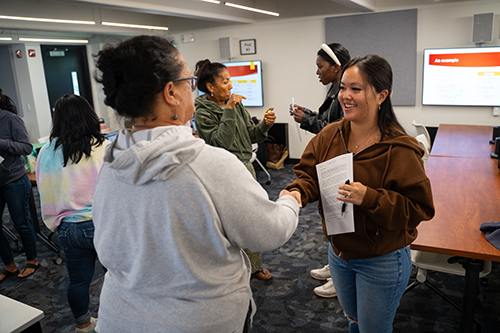Chaminade students participate in sustainability entrepreneurship
Madison Makishima ’25 was able to make adaptive surfboards out of recyclable materials and ocean plastics so people —like her—with disabilities could have access to the ocean. As part of Chaminade University’s ‘Inana Sustainability Entrepreneurship Program, Makishima and eight other fellow students, including Aleeyah Lemons ’24 and Carly Wieczorek ’24, were able to participate in a 10-week summer program that paired them with businesses that align with the United Nation’s Sustainable Development Goals (SDGs).
“I learned a lot, especially how to effectively network,” said Makishima, whose project was titled Surf Sesh. “The mission of the project—which aligns with the UN’s SDGs—was to help people with disabilities gain access to surfing while recycling and reusing ocean plastic, and educating everyone about living sustainable lives.”
After winning a two-year $600,000 Minority Colleges and Universities Grant Competition from the U.S. Department of Commerce’s Minority Business Development Agency (MBDA), a hui of Chaminade professors developed the ‘Inana Sustainability Entrepreneurship Program, which aims to spark minority entrepreneurial innovation among Hawaii-Pacific undergraduates.
According to ‘Inana Sustainability Entrepreneurship Program’s coordinator, Mariane Uehara, the three goals of the program are: 1) To develop and implement programs for the education and training of undergraduate students in subjects directly relating to successful entrepreneurship; 2) To support minority business enterprises (MBEs), including building a diverse entrepreneurial pipeline to grow the number of MBEs; and 3) to create a UN Certificate program in sustainability entrepreneurship.
With the help of Rhea Jose, outreach coordinator for CIFAL Honolulu at Chaminade, Aleeyah Lemons ’24 pursued a project titled “Gender Equity through Malama Mai” or, cleverly, GEMM, and provided menstrual products in the women’s restrooms at Chaminade University.
“GEMM is a program developed to provide resources, care and education on menstrual health to those at Chaminade University, its surrounding community and across the Pacific,” wrote Lemons in her final report. “We aim to end period poverty on campus, and allow our students who menstruate to feel comfortable and supported by GEMM and their peers.”
Meanwhile, Carly Wieczorek ’24 designed a sustainable rooftop hydroponics system. “One major aspect of my activities was actively participating in exchanging ideas with local experts on hydroponics farming, visiting hydroponics farms on Oahu, and entrepreneurial skill workshops with industry professionals,” Wieczorek noted. “I’ve also been investigating innovative business approaches to urban agriculture, such as rooftop hydroponics, and examining how these practices align with the UN’s SDGs.”
The focus of the ‘Inana program is to nurture sustainability entrepreneurs in Hawaii, who will develop businesses that diversify and grow our economy while attending to the health of the planet. This, of course, is consistent with Chaminade’s United Nations CIFAL Center, which is focused on supporting progress toward the UN’s 17 SDGs in Hawai‘i and the Pacific region.
Three of the 17 SDGs in particular are addressed within the program: Promote sustained, inclusive and sustainable economic growth, full and productive employment and decent work for all; build resilient infrastructure, promote inclusive and sustainable industrialization and foster innovation; and improve education, awareness-raising and human and institutional capacity on climate change mitigation, adaptation, impact reduction and early warning.
“Our first cohort consisted of nine students,” said Uehara, a Certified Health and Wellness Coach and former co-founder and director of Lanikai Juice Co. “This second cohort will focus on App creation with eight students. It’s great to see students—who all come from different disciplines—collobarate and solve problems.”














